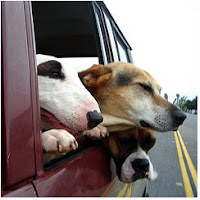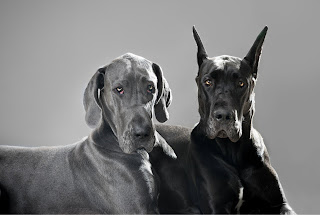Dog blog 3 - insects
 Robot crickets
Robot crickets
New Scientist is reporting a story about Pentagon backed researchers creating cyborg crickets. Will these crickets speak too? Would they say "I vant your clothes, your boots and your jam"? Will they take over the world? And maybe do a lot of time travelling just to make whatever they're planning to do really complicated to follow?
You can see the New Scientist story here: http://www.newscientist.com/article/mg20327165.900-cyborg-crickets-could-chirp-at-the-smell-of-survivors.html
And there's plenty of other stories in New Scientist about experiments on animals. Mice for example: http://www.newscientist.com/search?doSearch=true&query=mice.
Scientists do lots of experiments on mice. They give them cures for cancer, improve their intelligence, extend their lifespans. Maybe one day these super mice will bite back and give us a good bashing. Or maybe they'll rise above that and just give us a nice piece of cheese. Like a good cheddar. Or maybe a brie. But if they went for the brie option, I think they'd really need to give us that with grapes and proper crackers: it's a big ask though.
All animals are equal.......
Peter Singer writes about the ethical case for giving animals more respect in our moral decision making. Have a look at this article for example: http://www.utilitarian.net/singer/interviews-debates/200106--.htm. He writes:
"People often say, without much thought, that all human beings are infinitely more valuable than any animals of any other species. This view owes more to our own selfish interests and to ancient religious teachings that reflect these interests than to reason or impartial moral reflection. What ethically significant feature can there be that all human beings but no nonhuman animals possess? We like to distinguish ourselves from animals by saying that only humans are rational, can use language, are self-aware, or are autonomous. But these abilities, significant as they are, do not enable us to draw the requisite line between all humans and nonhuman animals. For there are many humans who are not rational, self-aware, or autonomous, and who have no language—all humans under 3 months of age, for a start. And even if they are excluded, on the grounds that they have the potential to develop these capacities, there are other human beings who do not have this potential. Sadly, some humans are born with brain damage so severe that they will never be able to reason, see themselves as an independent being, existing over time, make their own decisions, or learn any form of language."
Are humans worthy of respect? And more so than other animals?
We could start by saying we're worthy of respect "because we're human". But that sounds like saying "we matter because we matter" or "we're special because we're special". Which sounds a bit circular, and doesn't really feel very solid ground on which to stand an argument. Might someone making a statement like that be doing it more for subconscious reasons, like a religious predisposition for example?
If we're looking for a more solid base on which to set up our argument tent (and maybe have a stall outside it for tea and biscuits), I think we'd want to point to characteristics that we think are worthy of respect in humans. The sorts of things that explain why other humans "count" when we're working out what the best thing to do in a particular case is. Or when we're trying to come up with, or agree a more general rule for, dealing with something.
Like forming a queue for a bus. Or letting people go in front of you in the queue if they're a bit poorly, or very old and it's difficult for them to get on the bus. Some folk in the queue might complain a bit if you did that, because they'd been waiting a long time (and might have lots of shopping to carry). But others in the queue would just look round at the complainers and give them a bit of a "look". And then, probably, the complainers might back down a bit. Not just for an easier life (and to get on the bus sooner), but also because they might feel a bit ashamed.
Picking out some things about each other. For starters (in making a moral argument sense, rather than a dinner sense).
Some of the characteristics I think are worthy of respect in humans are:
(a) our self awareness: in many of us at least (Peter S. gives us some examples of the less fortunate in his essay);
(b) the nice things: planning (in a nice way) for the future, looking after our young and the sick, helping plants to grow, making things (like jam, constitutional statutes and telly), our ability to feel nice things (like being cheery, enjoying jam, getting excited about things - like jam (again)), or going out for a nice walk, or a new series on telly (like when the re-envisioned Battlestar Galactica was at its height towards the middle of season 2);
(c) the not-so-nice things: our capacity for violence, for example. And a propensity to behave very differently in groups: which could be nice if the thing(s) we were doing were nice. I'm talking about behaving in groups here because, I believe, the conscious bit of our brain is sitting on top of at least 150,000 years of evolution through violence and struggle for survival. And occasionally those bits of our brains kick in when we're thinking about what we should do. You know, some of the bad bits about us. And also our ability to feel bad things (like pain for example, or sorrow, or loss. Or sad about something).
These characteristics are mostly abilities
I think these characteristics are all abilities of one sort or another. If you're in the "it's just because we're human that makes us special" camp, then I think you're more in an "identity first, reasons why that is, for later" camp. And we'll just be talking at cross purposes if I can't persuade you to at least to point to some other reasons.
If you're following me, and (even better) agreeing with a good bit of what I'm saying, it's difficult to say why these characteristics, these abilities, single us out particularly when thinking about what to do about something. Especially when that what to do about something particularly involves or affects other species too.
A continuum of development - a reason to treat things differently?
Peter Singer and Richard Dawkins had a chat about this sort of thing. It's on YouTube:
Richard Dawkins makes an interesting point: different species could be seen as being at different stages along a continuum of ability. Could we therefore argue that the more developped these abilities are, the greater the weight these abilities should play in our moral thinking?
We'd need evidence of course and people always disagree about whether animals suffer or get sad. In the case of dogs at least, as Mark Rowlands says in his book The Philosopher and the Wolf, people who think that dogs don't suffer or get sad have obviously never owned one.
The lower end of the continuum
So what about the lower end of this continuum? Back to our "terminator" robot crickets. Say crickets are mildly self aware (say they have a hive mentality), do like jam a bit, but don't feel pain (because say their nervous systems are different - I don't know either way, I'm just using it as an example), and don't plan for the future. Might it be defensible to give them less weight in thinking what to do about something? Say, controlling a very small number of their species to help find injured humans, or indeed other animals (like a trapped dog or cat) trapped under a collapsed building?
I think there is some merit in that. And I think it would be defensible (if the facts are right about crickets feeling pain, etc.) to give less weight to those characteristics than we might do in humans. But it wouldn't get us out of thinking about alternatives though. What about developing an entirely robotic cricket? It's an interesting one.
And moving along the continuum...
A harder one is where abilities are far more adapted. Like in mice. Or monkeys. Or other animals that we experiment on. Or eat.
Once you've picked out some characteristics, how do you then do your weighings when thinking about your doings?
To me, the characteristics bit I've picked out above is only a part of thinking about lives, and thinking about your doings with them. It's just part of an even more complicated reasoning process where we bring in other things and thinkings too. And weigh them all up to come to a decision.
I'll need to come back to this in another Dog Blog. And I need to have a right good think before then about whether it's a defensible form of reasoning to talk about "weighing" things up at all. I'm running out of time, and I really need to pop into town to pick up a new suit for work that I got adjusted, and something for lunch. And a present for a pal of mine I'm visiting tomorrow.
The sorts of things to throw in the mix that I'm thinking about here come from the purpose of the thing you're doing. Take some examples:
- Swatting a wasp that looks angry and about to sting you. You see them around autumn/fall. You know the type. I got one up my tee shirt last year. It stung me. And it hurt. Quite a lot.
- Killing a bull for the pleasure of it (e.g. bullfighting in Madrid. I went to a bullfight there. I had mixed feelings about it. The final death bit looked pretty quick. But these are just quick reaction feelings, not an argued out, defensible moral position.).
- Scientists doing experiments on a very small number of mice relative to the overall number of their species, to help find a cure for cancer. But say they were not just trying to find it for humans, but also for mice and other animals too?
- Farming cows for milk and/or meat.
Thinking about your doings: putting an "arbitration kit" together
To think about these, I think we also need to put in our weighings what the alternatives are, what the impact on our global society might be if we go down that road. What would be the overall impact on the animal and plant kingdoms? What would it do to our own development?
In doing that thinking - or more logically, before we come to that - we also need to have some criterion for arbitrating between these various factors. We're not really comparing like with like (e.g. love of jam versus bullfighting versus how a mouse might best survive cancer).
Some people talk about this arbitrator being a "theory of the Good". Or "Justice". John Rawls made his own "arbitration kit", and called it the "original position" . Have a look at http://plato.stanford.edu/entries/original-position/ (which is a bit heavy) or http://en.wikipedia.org/wiki/Original_position (which is a bit easier to read).
The Original Position starts with a thought experiment. It's a bit like imagining you're hovering about in the afterlife, waiting in the departure lounge at Reincarnation Airport. (Maybe with a fun magazine to read (like "Heat") and a coffee and panini from Costa). And, you don't know what you're going to be reincarnated as. You might be reincarnated as a human, say, into a rich family. Or you might be reincarnated severely disabled, or as a different race, or gender. You might be very clever. Or really daft. You might be reincarnated as a cat, or a dog. Or a bee.
And then, in putting your kit together, you need to think about the sorts of values you would want to see in a society that you might be born (and bourne) into.
It's a tricky one if you're born as a dog, but what about as a human? Would you want a system of government? Would you want equal respect regardless of your age or gender? What sorts of things would you want to see for frail people? Or children? Or the severely mentally disabled?
I'll let you have a think about that one: I need to scoot now. And I'll need to have a think in a later Dog Blog to what extent an "Original Position" type of arbitration kit can really factor in animals other than humans into it.
Since, as far as we're aware, it's doubtful that other animals would have a similarly evolved system of justice. Though, there is some evidence that chimpanzees, for example, do have a sense of society and their place in it. Franz de Waal writes about "Chimpanzee Politics" (which you can buy on Amazon at http://www.amazon.com/Chimpanzee-Politics-Power-among-Apes/dp/0801863368) - and to be able to play politics, chimps need to have some developed sense of what makes other chimps tick. And what makes them happy. Which is the beginnings of moral reasoning.
An answer may be that we humans need to start from the point of view that we might be reincarnated on Earth as a dog. But reincarnated as a dog in which humans live in a reasonably developed society. In that case, how would we dogs want humans to treat us?
Later, Dog followers..........



Comments
Post a Comment